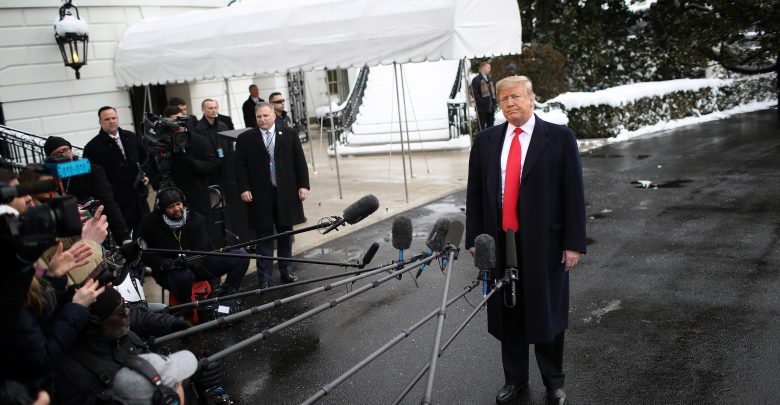
Trump Is Too Incompetent at His Job to Escape His Own Shutdown
January 14, 2019When the partial federal government shutdown began on December 22, it came practically out of nowhere. In the past, Donald Trump groused about how funding bills failed to provide money for his much-hyped wall along the southern border, but he signed them anyway, including one in late September. This time, however, he stuck to his demand for the wall, and the resulting shutdown, now the longest in US history, has had serious consequences: Food inspections are less frequent, scientific labs have shut down, Native American tribes lack money for essential needs, and border and airport security officers are working without pay when they're not calling in sick. On Friday, roughly 800,000 federal employees missed their first paycheck of the shutdown, putting their finances in jeopardy.
The worst aspect of this shutdown is that all this pain was entirely avoidable. That the country has reached this point is an indictment of Trump's ability to make deals with the opposition, read public opinion, and determine which fights are worthwhile—in other words, it reflects his core ineptitude at the routine business of governing. Trump has boxed himself into a position he can't get out of because at a very basic level, he has no idea what he's doing. This may not seem all that shocking after nearly two years of Trump's presidency and an entire career of business failure and bluster before that. But it's worth pausing to reflect on the lack of anything resembling a coherent political strategy here, even as regular Americans are left to suffer.
The US has seen several shutdowns in the last couple of decades and by now the script is familiar. One side (usually Republicans) insists that in exchange for continuing to keep the government funded, the other side (usually a Democrat in the White House) agree to some concessions. What follows is an argument over who is to blame for the shutdown, but the public tends to hold the shutdown initiators—that is, the people doing the demanding—at fault, and that side has to back down. That's the accepted narrative of the Republican-initiated 1995–96 shutdown (until this one, the longest ever), as well as the 2018 shutdown, which saw Democrats make demands on immigration before basically folding less than three days into it.
These past shutdowns were initiated by the opposition party, not the president, but other than that this current shutdown isn't radically different. Because it is Trump and the GOP making demands, the public is mostly blaming them, according to polls. Responding to that pressure in the usual way, some Republican legislators clearly want to end the shutdown—even Trump ally Senator Lindsay Graham has said that the government should reopen while the parties negotiate over border security. But Trump has rejected Graham's proposal, and in fact he's refusing to take all the seemingly clear paths out of the shutdown. He won't give in and approve a wall-free spending bill, he apparently won't make concessions to the Democrats, and he's said he won't even declare a state of emergency to build the wall without Congress's OK, a questionable legal strategy that would at least probably end this standoff.
One explanation for this is that Trump hopes to pressure Democrats—especially newly elected representatives from moderate, suburban districts—into folding and giving him his wall. And some of those Democrats may want to make a deal. But overall, Trump doesn't have a winning position. The wall is unpopular both nationally and in some key swing states, and Trump just spend the midterm election cycle trying to gin up fear about immigration only to lose the House to Democrats. And though Democrats approved of more modest barriers on the border a decade ago, the party has become more pro-immigration since, and today's Democratic base would revolt if their leaders conceded the wall to Trump. Finally, since the president has often shifted positions in these negotiations in the past, Democrats have less reason to compromise with him.
As a politician, Trump has obvious talents—he couldn't have gotten elected president without an ability to read the Republican base, control the media narrative, and tell a convincing story to voters. But governing requires a different set of abilities. Presidents have to strategize, prioritize, and sometimes compromise, and Trump hasn't shown much or any ability to do those things. He could have made a deal with the Democrats last year on immigration and gotten his wall, but he declined, instead making additional demands that the Democrats didn't accept. One losing election later, with less leverage, he's trying to get something for nothing in a shutdown that is damaging the economy and making him even less popular.
Maybe Trump is right and Democrats will surrender. But the polls and the history of shutdowns suggest Democrats have a better political position and will stick to their guns. Meanwhile, Republicans could vote to override Trump's veto and reopen the government anytime Senate Majority Leader Mitch McConnell allows it. That option would involve its own risks for Republicans, but it's clear Trump doesn't understand or doesn't care how bad this shutdown is for both the country and his presidency. His allies need to save him from himself, and save those 800,000 government workers while they're at it.
Sign up for our newsletter to get the best of VICE delivered to your inbox daily.
Follow Harry Cheadle on Twitter.


